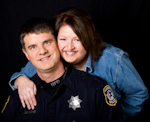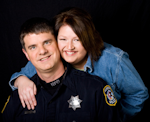Supervising Strengths
Being a good supervisor is hard work. For that matter, being supervised isn’t always a walk in the park either, but having a good, hard-working supervisor makes all the difference between whether a subordinate flourishes or flounders. Each of us having filled both roles – those of leader and led – over the years, and each having experienced leaders both exceptional and atrocious in that time, has been a boon as we write and teach about morale in law enforcement. It’s helped us when we’ve stepped into leadership and supervisory roles at times, and it has also made us better followers. Once we got past the emotional scarring that followed the atrocious bosses, that is!
Recent events have led our thoughts again to morale and the influence supervisors – especially the direct line bosses - have on the job satisfaction and morale of their officers. First, we’re about to hit the road, teaching a number of classes titled Police Morale for Supervisors: It IS Your Problem and, second, a close friend just recently earned his stripes. As a newly minted sergeant he will be responsible for leading, and inspiring, a crew of young night shift officers. This was what led Althea to the revelation that what we teach and espouse about morale is really not far off one of the prevailing theories and, for many, guiding principles of her Social Work profession. The Strengths Perspective was the basic framework for so much of what we learned on the way toward our master’s degrees in that field; viewed from a somewhat different angle, most of it would hold up well as a supervisory and administrative philosophy, too.
The Strengths Perspective in Social Work Practice
The strengths perspective was a clinical practice model created in the social work field, building on the idea that clients and/or client groups all have tapped and untapped skill sets, energy, and momentum in their own lives. It was devised as an alternative to a long-standing tendency and practice that arose out of psychoanalytic theory to view clients/patients as “pathology units” to be analyzed, labeled, and fixed. The strengths perspective instructs clinicians to guard against allowing negative labels dictating or constraining treatment that a given client or client group might receive. Instead, finding and respecting a client’s unique strengths, engaging motivation for change through those strengths, collaborating with the client in therapy (while avoiding the “victim mindset” that sees the client as helpless and in need of the therapist to “act on” or “fix”), and indentifying existing resources in the client’s environment are key principles in the strengths perspective.
The more traditional Deficit Model of therapy can be traced to the link that exists between traditional mental health treatment and adherence to a medical model in addressing the problems life throws at us; essentially, when a client comes to a clinician, the problems they present are viewed through the prism of underlying pathology (hence, the viewing of patients as “pathology units” as much or more so than unique individuals) identified by the therapist. The therapist then attacks the problems by attacking the pathology as something to be corrected, with the problems to eventually follow suit.
The problem with this model is how it tends to focus more on what isn’t working in the patient’s life than what is, that the patient is objectified as a product of pathology (a problem) rather than someone who is surviving despite any other problems, and its rather non-holistic approach to treatment. A strengths perspective identifies and builds on what works, and overcomes deficits by generalizing a client’s existing power. The deficit model just tries to attack underlying pathology and mold the patient into a more acceptable package.
Of the two, the strengths perspective has shown the greatest success in terms of client engagement, long-term change, and skill generalization.
That’s great, but what does this have to do with police supervision?
Quite a bit, actually. If you’re a police supervisor or administrator you generally have at least some responsibility for the oversight, direction, motivation, evaluation, and discipline of subordinate officers. That is not always an easy task. Cops can be challenging in all those areas of responsibility, and finding an effective philosophy and style of leadership is important in order to be that good supervisor or administrator you want to be.
Unfortunately, a lot of supervisors take a deficit model approach to running their crew. It starts with the boss setting an agenda with little or no input from his team, shift, division, or department, freezing out the voices and ideas of motivated employees. The boss then determines how the goals of this agenda will be met with little consideration of how that strategy will impact the team, or whether it even meshes with the unique personalities and skill sets that make up the affected officers. The boss tries to rally enthusiasm – or just assumes the enthusiasm will be there because, well, “I like it, and I’m in charge because of my superior intellect and skills, so surely they will love my plan, too!” – with mixed results. At first, everyone goes along with the plan because it’s easier to acquiesce than debate, they want to please the boss, they hope eventually the agenda will be forgotten and they can go about doing their jobs the way they see fit, or out of loyalty to the hierarchy.
Eventually, though, if not everyone is on board with the bosses agenda dissent will creep in, the agenda will be gradually ignored – maybe subtly, but sometimes with a flagrant disregard toward the authority of the boss – and forgotten, and tension rises. Previously motivated officers chafe under dictates made without seeking their input or considering their opinions, and motivation flees and productivity drops. Morale dips and, in the worst cases, officers even act out their frustration. Not only is the supervisory or administrative agenda not being followed, but now the boss’s attention is diverted by disciplinary issues. And this is where our nascent “deficit model of police supervision” and all its shortcomings kicks in…!
The boss must now devote all energy to putting out fires rather than providing true leadership. Deficits – poor work quality, decreased productivity, absenteeism, misconduct, low morale, and others - are attacked piecemeal, with a view toward stamping out one fire in order to move on to the next without ever really understanding the underlying issue from the point of view of the officers… or toward finding a better, more responsive, more effective way to supervise the unique individuals who make up the team.
Does any of that sound familiar? Have you worked for or with a supervisor, or are you a supervisor now, who has ever had to run around wasting time and energy putting out fires all day, unpopular with officers, and wondering why? Do you aspire to supervision and want to be the type of boss who brings out the best in your subordinates? The deficit model of supervision seems easy (“By the power vested in me by the jurisdiction of ________, in the County of ________, and the State of ________, I’m the BOSS, DAMMIT!!! You WILL do to what I say!”) but it’s really not. There is a better way.
In our next column we will look more closely at how bosses can apply a strengths perspective to their supervision, and how doing so can increase both morale and the quality of work produced by their teams.
Web Links:
About The Authors:
Althea Olson, LCSW has been in private practice in the Chicago suburbs since 1996. She has a Master of Social Work degree from Aurora University providing individual, couple, & group therapy to adolescents, adults, and geriatrics. Althea is also trained in Critical Incident Stress Management & is a certified divorce mediator.
Mike Wasilewski, MSW has been with a large suburban Chicago department since 1996. He holds a Master of Social Work degree from Aurora University and has served on his department’s Crisis Intervention & Domestic Violence teams. Mike is an adjunct instructor at Northwestern College.
Mike & Althea have been married since 1994 and have been featured columnists for Officer.Com since 2007. Their articles are extremely popular and they now provide the same training and information in person throughout the United States. This dynamic team was recently featured at the at the 2010 & 2011 ILEETA Conference & Exposition.
Out of their success has come the formation of More Than A Cop where the focus is providing consultation and trainings on Survival Skills Beyond The Street.

Michael Wasilewski
Althea Olson, LCSW and Mike Wasilewski, MSW have been married since 1994. Mike works full-time as a police officer for a large suburban Chicago agency while Althea is a social worker in private practice in Joliet & Naperville, IL. They have been popular contributors of Officer.com since 2007 writing on a wide range of topics to include officer wellness, relationships, mental health, morale, and ethics. Their writing led to them developing More Than A Cop, and traveling the country as trainers teaching “survival skills off the street.” They can be contacted at [email protected] and can be followed on Facebook or Twitter at More Than A Cop, or check out their website www.MoreThanACop.com.

Althea Olson
Althea Olson, LCSW and Mike Wasilewski, MSW have been married since 1994. Mike works full-time as a police officer for a large suburban Chicago agency while Althea is a social worker in private practice in Joliet & Naperville, IL. They have been popular contributors of Officer.com since 2007 writing on a wide range of topics to include officer wellness, relationships, mental health, morale, and ethics. Their writing led to them developing More Than A Cop, and traveling the country as trainers teaching “survival skills off the street.” They can be contacted at [email protected] and can be followed on Facebook or Twitter at More Than A Cop, or check out their website www.MoreThanACop.com.


